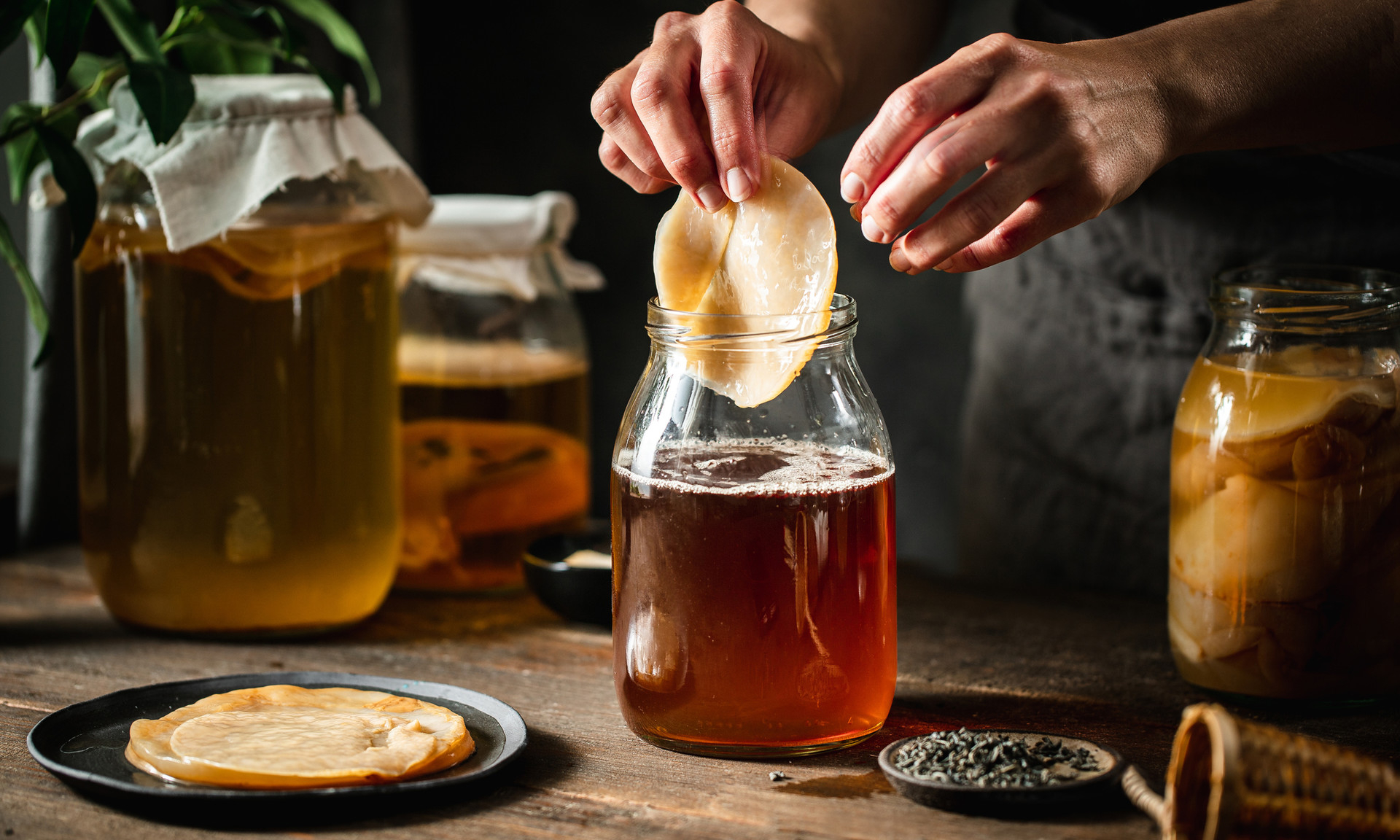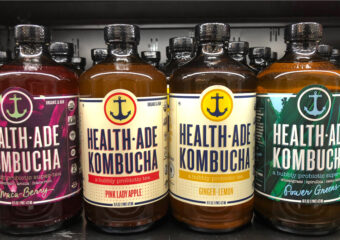Discovering the Levels of Caffeine in Kombucha and Essential Information to Keep in Mind.
Kombucha, a fermented herbal tea beverage, has gained popularity in recent times for its delicious taste and potential health benefits. But did you know that this trendy drink also contains caffeine? For those who start their morning with a bottle of kombucha instead of coffee, understanding the caffeine content is essential.
Before we dive into the specifics, let’s begin with the basics. Kombucha is typically made by fermenting a blend of black or green tea with sugar and a symbiotic culture of bacteria and yeast (SCOBY). The fermentation process can take several days or even weeks, depending on the desired level of fizziness and flavor.
While kombucha is known for being a rich source of probiotics and vitamins, its caffeine content varies among different brands and flavors. The initial tea used and the length of fermentation can impact the final result. On average, a bottle of kombucha may contain less caffeine than a cup of coffee, but it can still provide a pick-me-up for those sensitive to caffeine.
Is Kombucha High in Caffeine?
If you’re someone who enjoys a delicious blend of sweet and tangy flavors, kombucha may be the perfect drink for you. Kombucha is a fermented beverage that is known for its health benefits, such as supporting gut function and providing a source of probiotics. However, if you’re sensitive to caffeine or trying to keep your caffeine levels low, you may be wondering whether kombucha is high in caffeine.
Kombucha is made by steeping tea leaves in boiling water and then adding sugar and a SCOBY (symbiotic culture of bacteria and yeast) to ferment the mixture. The initial process of brewing kombucha involves using tea, which contains caffeine. Therefore, the amount of caffeine in kombucha will depend on how the drink is made.
On average, homemade kombucha will have about 15-30 mg of caffeine per 8 oz serving, while some commercially available brands may contain more or less caffeine. For comparison, a standard cup of coffee can contain anywhere from 80-100 mg of caffeine, so kombucha is definitely on the lower end of the caffeine spectrum.
If you’re looking for a kombucha that is caffeine-free, there are decaffeinated options available in the market. These decaf kombuchas go through a process to remove or reduce the caffeine content, so you can still enjoy the probiotic benefits of kombucha without the caffeine kick.
Health Benefits of Kombucha
Kombucha is a delicious drink that is known for its probiotic benefits. It is actually a fermented tea that is made with a blend of black and white tea, sugar, and a SCOBY (symbiotic culture of bacteria and yeast). The initial fermentation process creates a slightly sweet and tangy beverage that is loved by many.
One of the key health benefits of kombucha is its probiotic content. Probiotics are beneficial bacteria that support a healthy gut microbiome. Drinking kombucha can help to replenish these beneficial bacteria in your system, which can have a positive impact on your overall health.
Reduced Caffeine Levels
While some brands of kombucha may contain caffeine due to the black or white tea base, the caffeine content in the final product is actually lower than in the initial blend. The fermentation process breaks down caffeine, so you are left with a drink that has less caffeine than a cup of coffee.
For those who are sensitive to caffeine or want to limit their intake, there are also decaffeinated kombucha options available. These products go through an additional step to remove the caffeine, so you can enjoy all the benefits of kombucha without the stimulating effects of caffeine.
Impact of Caffeine on Health
When it comes to the health benefits of kombucha, the caffeine content can play a significant role. While some people enjoy the initial kick that caffeine provides in the morning, there are also those who need to lower their caffeine consumption for various reasons.
Kombucha is a fermented product that is made with tea, which contains caffeine. Therefore, the final product will always have some level of caffeine in it. However, there are ways to enjoy kombucha without the caffeine kick.
One way to reduce the caffeine content in your kombucha is by using herbal tea blends instead of traditional black or green tea. Herbal teas are caffeine-free, so using them in your kombucha recipe will result in a lower caffeine level in the finished product.
Health-Ade and Kevita are two brands known for their delicious and healthful kombucha products. Health-Ade offers a variety of flavors, including some that are caffeine-free. Kevita blends kombucha with other ingredients like vitamin C, magnesium, and probiotics, making for a refreshing and nourishing beverage.
Another way to enjoy kombucha without caffeine is to opt for decaffeinated tea bags when brewing your kombucha. Simply steep the decaffeinated tea bags alongside the regular tea bags in the initial fermentation process. This will lead to a reduced caffeine content in the finished product.
Ultimately, whether you choose to enjoy kombucha with or without caffeine depends on your personal health needs and preferences. Some people may benefit from the caffeine boost in the morning, while others may need to cut back on their caffeine intake. By exploring different blends and brands of kombucha, you can find a product that suits your health goals and tastes.
Decaffeinated Kombucha Options
If you’re someone who can’t handle caffeine, or if you’re looking to reduce your caffeine intake, there are still delicious and healthy kombucha options for you to enjoy. Many kombucha brands offer decaffeinated versions of their beverages to cater to those who are sensitive to caffeine or simply prefer to steer clear of it.
Decaffeinated kombucha is usually brewed using the same initial fermentation process as regular kombucha, but with reduced or eliminated amounts of black or green tea, which are the usual sources of caffeine in the beverage. This means that you can still enjoy the benefits of probiotics, antioxidants, and other health-supporting compounds found in kombucha without the caffeine content.
- Health-Ade: This brand offers a decaffeinated line of kombucha that lets you enjoy the delicious flavors of their brews without the caffeine. These decaf options are crafted with the same care and attention as their regular blends, so you can sip without worry.
- Juneshine: This brand provides decaf kombucha blends that are fermented for longer periods to reduce the caffeine levels naturally. Their decaf options are flavorful and refreshing, perfect for any time of day.
- Other Brands: Many other kombucha brands also offer decaffeinated versions of their drinks, so you have a whole world of options to choose from. Whether you prefer a sweet and fruity blend or a tangy and tart flavor profile, there’s a decaf kombucha for everyone.
Decaffeinated kombucha is a great way to enjoy the probiotic benefits of this fermented beverage without worrying about the potential impact of caffeine on your health or sleep. Whether you’re looking to reduce your caffeine intake, are sensitive to caffeine, or simply want to mix things up, exploring decaf kombucha options can provide a delicious and health-supporting choice for your daily routine.
Understanding the Caffeine Content in Kombucha
When it comes to kombucha, one of the main concerns for many people is its caffeine content. Kombucha is a fermented tea drink that has been enjoyed for centuries around the world. The caffeine content in kombucha can vary depending on how it is made and the ingredients used.
If you are someone who is sensitive to caffeine or if you are trying to lower your caffeine intake, it’s important to know that not all kombucha drinks are created equal. Some brands and products contain more caffeine than others, so it’s crucial to read the labels before drinking.
One of the key ingredients in kombucha is black tea, which contains caffeine. However, during the fermentation process, the caffeine content can actually decrease. The bacteria and yeast in the kombucha culture feed on the tea and sugar initially present in the drink, leading to a reduction in caffeine content over time.
For those looking for a kombucha drink with a lower caffeine content, there are decaffeinated options available. These products are made using a similar fermentation process, but with teas that have been steeped and cooled to remove most of the caffeine. Decaffeinated kombucha can be a great choice for those who want to enjoy the health benefits of kombucha without the stimulating effects of caffeine.
Some popular brands like Kevita, Juneshine, and others provide decaffeinated kombucha options that still offer the same probiotic benefits as their caffeinated counterparts. These products are a fantastic choice for those who are looking to support their health and well-being with a healthy, fermented drink that is low in caffeine.
Whether you prefer a caffeinated or decaffeinated blend, kombucha is a fantastic way to support your health and well-being. With its natural blend of fermented ingredients, kombucha can provide your body with essential nutrients like B vitamins, antioxidants, and magnesium. So, the next time you reach for a kombucha, make sure to check the label and choose the one that best fits your needs.
Health Benefits of Kombucha
Kombucha is a type of fermented beverage that has been enjoyed for centuries around the world. It is known for its delicious taste and health benefits. One of the key ingredients in kombucha is caffeine, which is typically found in the initial fermented mixture.
However, kombucha has lower levels of caffeine compared to other caffeine-rich drinks like coffee or tea. This makes it a healthy choice for those who are sensitive to caffeine or want to lower their caffeine consumption.
When kombucha is finished and ready to drink, the caffeine content may ultimately be affected by the ingredients used in the ferments. Some kombucha brands offer decaffeinated options for those who prefer to enjoy kombucha without caffeine.
Kombucha is also rich in vitamins and antioxidants, making it a healthy beverage choice. The fermented nature of kombucha contributes to its probiotic content, which is known to support digestive health.
Whether you prefer kombucha with caffeine or a decaffeinated option, there are different brands and flavors available in the kombucha world. From traditional kombucha to spirulina blends like Juneshine, there’s a kombucha option for everyone to enjoy.






